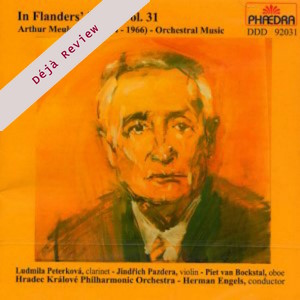
Déjà Review: this review was first published in June 2003 and the recording is still available.
Arthur Meulemans (1884-1966)
Kermisfantasie (1930)
Twee Movimenti (1927)
Twee Idyllen (1927)
Overture to Adriaen Brouwer (1935)
Concerto voor hobo en orkest (1942)
Rhapsodie (1932)
Twee Dansen (1911/3, orch. 1930)
Ludmilla Peterková (clarinet); Jindřich Pazdera (violin); Pier van Bockstal (oboe)
Hradec Králové Philharmonic Orchestra/Herman Engels
rec. 2002, Concert Hall, Philharmony Hradec Králové, Czech Republic
Phaedra 92031 [58]
Meulemans’ huge output includes many orchestral works, a number of concertos as well as much chamber and vocal music, the backbone of which undoubtedly consists of his fifteen symphonies and of which shamefully little is available in recordings. So, the present release offers a tantalising survey of his orchestral music, albeit in small form and in lighter mood. These pieces date from various periods in his long and prolific composing career. Most of them are well-crafted and superbly scored works in which Meulemans’ orchestral flair and mastery are clearly displayed.
The earliest piece here Twee Dansen (Exotic Dance and Waltz) were originally written for piano in 1911 and 1913 respectively, and orchestrated as a diptych in 1930. These delightful miniatures are superior light music, no doubt, but very attractive and entertaining in their own right. The somewhat later Twee Movimenti for violin and orchestra and Twee Idyllen for oboe and orchestra both date from 1927, and are the kind of lighter stuff that, say, Frank Bridge could have written, and none the worse for that. The Second idyll (“of a city dweller”) is particularly fine; a sort of atmospheric urban idyll of great charm.
Meulemans began thinking about his opera Adriaen Brouwer in the early 1920s but completed the score only in 1926. The first stage performance, planned for the 1940-1941 season of the Antwerp Opera, was cancelled partly because of the outbreak of World War II and partly because the conductor thought that it put too many demands upon the performers. It had to wait until 1947 when Daniël Sternefeld conducted the first performance. The overture, however, was written much later, in 1935. It is an altogether more serious piece than the rest of this programme. Meulemans conceived it as an orchestral fantasy or rhapsody on themes from the opera. This is vintage Meulemans, and it gives a fairly good idea of his mature works.
Adriaen Brouwer (1605–1638) was not the only painter to inspire Meulemans. Actually, Rembrandt provided the inspiration for the majestic Thirteenth Symphony (orchestra and organ) of 1950, Bruegel for the orchestral suite Pieter Bruegel of 1952 and David Teniers (1610–1690) for the lovely Kermisfantasie op twee volksrythmen naar een schildreij van David Teniers composed in 1930 in which Meulemans pays a twofold tribute to Teniers and to Jan Blockx (1851–1912) best known for his colourful Flemish Dances (available on Naxos 8.550584). This is a delightful romp, vividly depicting a peasant feast (Teniers excelled at such scenes) based on old Flemish dance tunes dressed-up in gorgeous orchestral colours. This is definitely the sort of thing that would be popular, were it played more often.
The Rhapsody for clarinet and orchestra (1932) is one of the many concertante works which Meulemans composed throughout his long career. In turn, dramatic, declamatory or lyrical, the music exploits the entire expressive palette of the instrument. When it was published in the 1940s, the piece was chosen as a test piece by several Belgian conservatories.
Meulemans composed many concertos. It is almost a case of name an orchestral instrument and Meulemans has written for it. There is one each for trumpet, trombone, timpani, saxophone quartet and clarinet quartet besides those for the more usual instruments: piano, violin, viola, cello, flute, horn and harp. The Oboe Concerto dates from 1942 and is a perfect example of Meulemans’ instrumental mastery. Not particularly demanding, maybe, but quite rewarding to play and to listen to. Piet van Bockstal obviously loves this engaging piece, as he did the earlier Idyllen.
Everyone here plays with obvious enjoyment of the music which must have been quite unfamiliar for the Czech players who superbly rise to the occasion. Meulemans fans will want to have this, and others too will find a lot to enjoy. Lighter stuff, probably, but, it is to be hoped, a taste of “Things to Come” as regards Meulemans’ still shamefully limited discography. I now await for a long overdue recording of the masterly Ninth Symphony, probably one of his finest, and – more generally – for more of his music on discs.
Hubert Culot
Availability: Phaedra (Bandcamp)


















